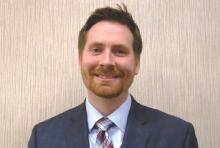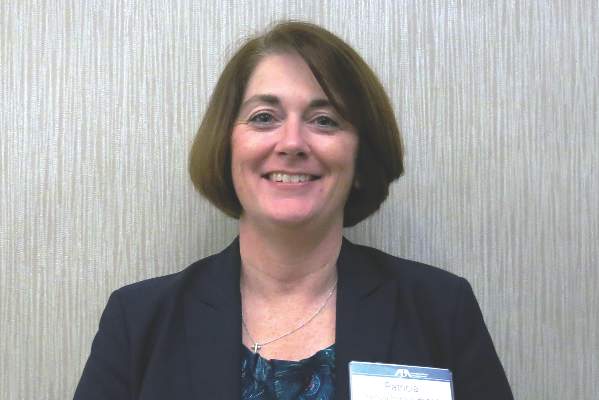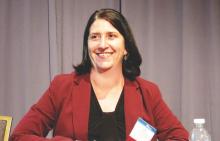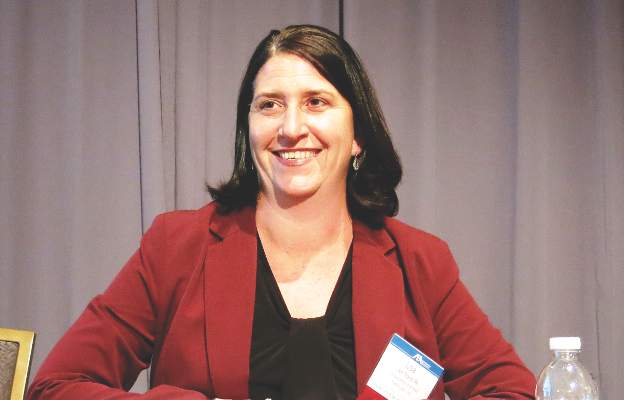User login
American Bar Association (ABA): Washington Health Law Summit
Ask patients about military service, lawyers urge
Do you ask your patients, “Have you served in the military?”
That simple inquiry could have a major impact on whether military veterans get needed services and legal assistance, Patricia E. Roberts, director of the Lewis B. Puller Jr. Veterans Benefits Clinic at William & Mary Law School, Williamsburg, Va., said at a meeting sponsored by America Bar Association.
When encountering veterans in need of benefits or legal services, physicians also can help by contacting a local American Legion, VFW, or local U.S. Department of Veterans Affairs (VA) regional office, William A. Burke, a maritime lawyer based in Norfolk, Va., said at the meeting.
A growing number of law school clinics such as the Lewis B. Puller Jr. Benefits Clinic also address veterans’ legal needs, largely at no expense to the veteran. The newly created National Law School Veterans Clinic Coalition includes 30 such law school clinics that have veterans assistance programs.
Strong partnerships between physicians and lawyers are essential in linking injured veterans to needed medical treatment and financial assistance, Ms. Roberts and other legal experts said. The VA identifies legal needs as among the most significant unmet needs of homeless and poor veterans.
Physicians and lawyers need to work together or at least be in communication with one another, Kenneth J. Goldsmith, legislative counsel and director of state legislation for the ABA governmental affairs office, said at the meeting. Physicians are frequently the first stop, as many veterans have easier access to medical professionals or may have more trusting relationships with their doctors.
The lawyers acknowledged that physicians inexperienced with the process of helping patients apply for benefits through the VA can be hesitant to get involved. Common misconceptions include that the documentation process is lengthy, that the burden of evidence must be high, and that physicians may be called as witnesses.
Ms. Roberts stressed that the burden of evidence that a disability is linked to military service does not have to be absolute. In veterans’ law, a doctor has to conclude that there is a 50% likelihood that a disability is service connected or that it is “just as likely as not.”
“With that standard, which I think is lower than in other arenas ... medical professionals could have even more of an impact than they realize,” she said.
To receive disability compensation that a veteran earns through service, the veteran must prove: a current disability, that the incident that caused the injury occurred during active duty, and that there is a nexus between the current disability and the veteran’s active duty service.
In straightforward cases, a doctor needs to fill out the VA’s disability questionnaire. No further VA contact or participation is necessary, Ms. Roberts said. More time is required if a medical records review is needed or if a veteran is claiming multiple injuries linked to military service.
Not every case is simple, however. In some instances, it may be difficult for health providers to parse psychological injuries of conflict from a mental illness the veteran had before serving, Mr. Burke said. Making matters more complicated is the potential aggravation of a prior mental illness during service. “There’s really a latticework of comorbidities at play here – PTSD, depression, anxiety, sleep disorders, substance abuse problems – and ... substance abuse is seen as a symptom [by the VA] rather than a disorder in and of itself. It’s a real challenge.”
Veterans stuck in the backlog of claims often are halted because of delayed physician documentation, which can be significant in certain complex cases, according to Mr. Goldsmith.
“You’re talking about when a veteran comes in claiming 36 different kinds of injuries,” he said. “The doctor is not compensated to [fill out forms]. But doctors who are savvy, [who] do understand these issues, and what the VA’s interested in seeing, can go through it more expeditiously.”
*Correction, 1/5/2016: A previous version of this article misstated William A. Burke's title.
On Twitter @legal_med
Do you ask your patients, “Have you served in the military?”
That simple inquiry could have a major impact on whether military veterans get needed services and legal assistance, Patricia E. Roberts, director of the Lewis B. Puller Jr. Veterans Benefits Clinic at William & Mary Law School, Williamsburg, Va., said at a meeting sponsored by America Bar Association.
When encountering veterans in need of benefits or legal services, physicians also can help by contacting a local American Legion, VFW, or local U.S. Department of Veterans Affairs (VA) regional office, William A. Burke, a maritime lawyer based in Norfolk, Va., said at the meeting.
A growing number of law school clinics such as the Lewis B. Puller Jr. Benefits Clinic also address veterans’ legal needs, largely at no expense to the veteran. The newly created National Law School Veterans Clinic Coalition includes 30 such law school clinics that have veterans assistance programs.
Strong partnerships between physicians and lawyers are essential in linking injured veterans to needed medical treatment and financial assistance, Ms. Roberts and other legal experts said. The VA identifies legal needs as among the most significant unmet needs of homeless and poor veterans.
Physicians and lawyers need to work together or at least be in communication with one another, Kenneth J. Goldsmith, legislative counsel and director of state legislation for the ABA governmental affairs office, said at the meeting. Physicians are frequently the first stop, as many veterans have easier access to medical professionals or may have more trusting relationships with their doctors.
The lawyers acknowledged that physicians inexperienced with the process of helping patients apply for benefits through the VA can be hesitant to get involved. Common misconceptions include that the documentation process is lengthy, that the burden of evidence must be high, and that physicians may be called as witnesses.
Ms. Roberts stressed that the burden of evidence that a disability is linked to military service does not have to be absolute. In veterans’ law, a doctor has to conclude that there is a 50% likelihood that a disability is service connected or that it is “just as likely as not.”
“With that standard, which I think is lower than in other arenas ... medical professionals could have even more of an impact than they realize,” she said.
To receive disability compensation that a veteran earns through service, the veteran must prove: a current disability, that the incident that caused the injury occurred during active duty, and that there is a nexus between the current disability and the veteran’s active duty service.
In straightforward cases, a doctor needs to fill out the VA’s disability questionnaire. No further VA contact or participation is necessary, Ms. Roberts said. More time is required if a medical records review is needed or if a veteran is claiming multiple injuries linked to military service.
Not every case is simple, however. In some instances, it may be difficult for health providers to parse psychological injuries of conflict from a mental illness the veteran had before serving, Mr. Burke said. Making matters more complicated is the potential aggravation of a prior mental illness during service. “There’s really a latticework of comorbidities at play here – PTSD, depression, anxiety, sleep disorders, substance abuse problems – and ... substance abuse is seen as a symptom [by the VA] rather than a disorder in and of itself. It’s a real challenge.”
Veterans stuck in the backlog of claims often are halted because of delayed physician documentation, which can be significant in certain complex cases, according to Mr. Goldsmith.
“You’re talking about when a veteran comes in claiming 36 different kinds of injuries,” he said. “The doctor is not compensated to [fill out forms]. But doctors who are savvy, [who] do understand these issues, and what the VA’s interested in seeing, can go through it more expeditiously.”
*Correction, 1/5/2016: A previous version of this article misstated William A. Burke's title.
On Twitter @legal_med
Do you ask your patients, “Have you served in the military?”
That simple inquiry could have a major impact on whether military veterans get needed services and legal assistance, Patricia E. Roberts, director of the Lewis B. Puller Jr. Veterans Benefits Clinic at William & Mary Law School, Williamsburg, Va., said at a meeting sponsored by America Bar Association.
When encountering veterans in need of benefits or legal services, physicians also can help by contacting a local American Legion, VFW, or local U.S. Department of Veterans Affairs (VA) regional office, William A. Burke, a maritime lawyer based in Norfolk, Va., said at the meeting.
A growing number of law school clinics such as the Lewis B. Puller Jr. Benefits Clinic also address veterans’ legal needs, largely at no expense to the veteran. The newly created National Law School Veterans Clinic Coalition includes 30 such law school clinics that have veterans assistance programs.
Strong partnerships between physicians and lawyers are essential in linking injured veterans to needed medical treatment and financial assistance, Ms. Roberts and other legal experts said. The VA identifies legal needs as among the most significant unmet needs of homeless and poor veterans.
Physicians and lawyers need to work together or at least be in communication with one another, Kenneth J. Goldsmith, legislative counsel and director of state legislation for the ABA governmental affairs office, said at the meeting. Physicians are frequently the first stop, as many veterans have easier access to medical professionals or may have more trusting relationships with their doctors.
The lawyers acknowledged that physicians inexperienced with the process of helping patients apply for benefits through the VA can be hesitant to get involved. Common misconceptions include that the documentation process is lengthy, that the burden of evidence must be high, and that physicians may be called as witnesses.
Ms. Roberts stressed that the burden of evidence that a disability is linked to military service does not have to be absolute. In veterans’ law, a doctor has to conclude that there is a 50% likelihood that a disability is service connected or that it is “just as likely as not.”
“With that standard, which I think is lower than in other arenas ... medical professionals could have even more of an impact than they realize,” she said.
To receive disability compensation that a veteran earns through service, the veteran must prove: a current disability, that the incident that caused the injury occurred during active duty, and that there is a nexus between the current disability and the veteran’s active duty service.
In straightforward cases, a doctor needs to fill out the VA’s disability questionnaire. No further VA contact or participation is necessary, Ms. Roberts said. More time is required if a medical records review is needed or if a veteran is claiming multiple injuries linked to military service.
Not every case is simple, however. In some instances, it may be difficult for health providers to parse psychological injuries of conflict from a mental illness the veteran had before serving, Mr. Burke said. Making matters more complicated is the potential aggravation of a prior mental illness during service. “There’s really a latticework of comorbidities at play here – PTSD, depression, anxiety, sleep disorders, substance abuse problems – and ... substance abuse is seen as a symptom [by the VA] rather than a disorder in and of itself. It’s a real challenge.”
Veterans stuck in the backlog of claims often are halted because of delayed physician documentation, which can be significant in certain complex cases, according to Mr. Goldsmith.
“You’re talking about when a veteran comes in claiming 36 different kinds of injuries,” he said. “The doctor is not compensated to [fill out forms]. But doctors who are savvy, [who] do understand these issues, and what the VA’s interested in seeing, can go through it more expeditiously.”
*Correction, 1/5/2016: A previous version of this article misstated William A. Burke's title.
On Twitter @legal_med
EXPERT ANALYSIS FROM THE WASHINGTON HEALTH LAW SUMMIT
Medicare audits: What leads to an exclusion?
WASHINGTON – While the line between an inadvertent billing mistake and intentional coding deception might be blurry, federal investigators are crystal clear about what drives them to exclude health providers from government health programs.
Rejection from Medicaid and Medicare comes down to severity and accountability, said Lisa Re, branch chief of administrative and civil remedies for the Health and Human Services Department Office of Counsel to Inspector General.
“At the end of the day, what we’re looking at is the seriousness of the conduct, cooperation with the compliance program, and whether or not there’s been a sense of financial responsibility – that the program has been made whole from the harm that was done,” Ms. Re said at a meeting sponsored by the American Bar Association.
In 2015, the Office of Inspector General (OIG) excluded 4,112 individuals and entities from participation in federal health care programs, up from 4,017 in 2014, according to a the OIG’s semiannual report to Congress published Nov. 30.
The office expects to recover nearly $3.4 billion in incorrect payments in 2015, down from $4.9 billion last year. The office also reported 925 criminal actions and 682 civil actions in 2015 involving false claims, unjust-enrichment lawsuits, civil settlements, and administrative recoveries.
When it comes to exclusions, investigators rely on the facts and circumstances of each individual case, Ms. Re said. Certain behaviors such as repeated disregard of government inquires and ongoing overbilling can lead to exclusions.
“We’re not trying to punish anyone,” Ms. Re said. “Exclusion is purely remedial. It’s a question of whether or not you have demonstrated sufficient trustworthiness for us to continue doing business with you.”
The OIG considers two types of exclusions – mandatory and permissive. The agency is obligated to exclude a provider if that professional is convicted of program-related crimes, is convicted of patient abuse or neglect, receives a felony health fraud conviction, or is convicted of two mandatory exclusion offenses. The OIG can use its discretion in situations in which a provider receives a misdemeanor conviction related to health fraud, has a license suspended or revoked, fails to disclose required information, fails to take corrective action, or makes false statements to the government, among others. Reinstatement of excluded entities and individuals is not automatic once the exclusion period ends. Those wishing to again participate in a federal health care program must apply for and receive reinstatement permission from the OIG.
Ms. Re stressed that her office is transparent about possible or upcoming exclusions during a payment investigation. If health professionals come under billing scrutiny, she encourages them and their attorneys to contact OIG officials to inquire whether an exclusion is likely or expected.
On Twitter @legal_med
WASHINGTON – While the line between an inadvertent billing mistake and intentional coding deception might be blurry, federal investigators are crystal clear about what drives them to exclude health providers from government health programs.
Rejection from Medicaid and Medicare comes down to severity and accountability, said Lisa Re, branch chief of administrative and civil remedies for the Health and Human Services Department Office of Counsel to Inspector General.
“At the end of the day, what we’re looking at is the seriousness of the conduct, cooperation with the compliance program, and whether or not there’s been a sense of financial responsibility – that the program has been made whole from the harm that was done,” Ms. Re said at a meeting sponsored by the American Bar Association.
In 2015, the Office of Inspector General (OIG) excluded 4,112 individuals and entities from participation in federal health care programs, up from 4,017 in 2014, according to a the OIG’s semiannual report to Congress published Nov. 30.
The office expects to recover nearly $3.4 billion in incorrect payments in 2015, down from $4.9 billion last year. The office also reported 925 criminal actions and 682 civil actions in 2015 involving false claims, unjust-enrichment lawsuits, civil settlements, and administrative recoveries.
When it comes to exclusions, investigators rely on the facts and circumstances of each individual case, Ms. Re said. Certain behaviors such as repeated disregard of government inquires and ongoing overbilling can lead to exclusions.
“We’re not trying to punish anyone,” Ms. Re said. “Exclusion is purely remedial. It’s a question of whether or not you have demonstrated sufficient trustworthiness for us to continue doing business with you.”
The OIG considers two types of exclusions – mandatory and permissive. The agency is obligated to exclude a provider if that professional is convicted of program-related crimes, is convicted of patient abuse or neglect, receives a felony health fraud conviction, or is convicted of two mandatory exclusion offenses. The OIG can use its discretion in situations in which a provider receives a misdemeanor conviction related to health fraud, has a license suspended or revoked, fails to disclose required information, fails to take corrective action, or makes false statements to the government, among others. Reinstatement of excluded entities and individuals is not automatic once the exclusion period ends. Those wishing to again participate in a federal health care program must apply for and receive reinstatement permission from the OIG.
Ms. Re stressed that her office is transparent about possible or upcoming exclusions during a payment investigation. If health professionals come under billing scrutiny, she encourages them and their attorneys to contact OIG officials to inquire whether an exclusion is likely or expected.
On Twitter @legal_med
WASHINGTON – While the line between an inadvertent billing mistake and intentional coding deception might be blurry, federal investigators are crystal clear about what drives them to exclude health providers from government health programs.
Rejection from Medicaid and Medicare comes down to severity and accountability, said Lisa Re, branch chief of administrative and civil remedies for the Health and Human Services Department Office of Counsel to Inspector General.
“At the end of the day, what we’re looking at is the seriousness of the conduct, cooperation with the compliance program, and whether or not there’s been a sense of financial responsibility – that the program has been made whole from the harm that was done,” Ms. Re said at a meeting sponsored by the American Bar Association.
In 2015, the Office of Inspector General (OIG) excluded 4,112 individuals and entities from participation in federal health care programs, up from 4,017 in 2014, according to a the OIG’s semiannual report to Congress published Nov. 30.
The office expects to recover nearly $3.4 billion in incorrect payments in 2015, down from $4.9 billion last year. The office also reported 925 criminal actions and 682 civil actions in 2015 involving false claims, unjust-enrichment lawsuits, civil settlements, and administrative recoveries.
When it comes to exclusions, investigators rely on the facts and circumstances of each individual case, Ms. Re said. Certain behaviors such as repeated disregard of government inquires and ongoing overbilling can lead to exclusions.
“We’re not trying to punish anyone,” Ms. Re said. “Exclusion is purely remedial. It’s a question of whether or not you have demonstrated sufficient trustworthiness for us to continue doing business with you.”
The OIG considers two types of exclusions – mandatory and permissive. The agency is obligated to exclude a provider if that professional is convicted of program-related crimes, is convicted of patient abuse or neglect, receives a felony health fraud conviction, or is convicted of two mandatory exclusion offenses. The OIG can use its discretion in situations in which a provider receives a misdemeanor conviction related to health fraud, has a license suspended or revoked, fails to disclose required information, fails to take corrective action, or makes false statements to the government, among others. Reinstatement of excluded entities and individuals is not automatic once the exclusion period ends. Those wishing to again participate in a federal health care program must apply for and receive reinstatement permission from the OIG.
Ms. Re stressed that her office is transparent about possible or upcoming exclusions during a payment investigation. If health professionals come under billing scrutiny, she encourages them and their attorneys to contact OIG officials to inquire whether an exclusion is likely or expected.
On Twitter @legal_med
AT THE WASHINGTON HEALTH LAW SUMMIT




